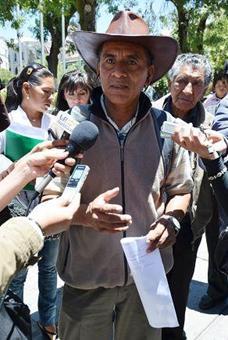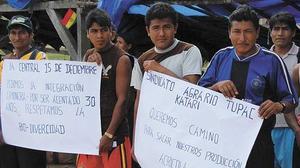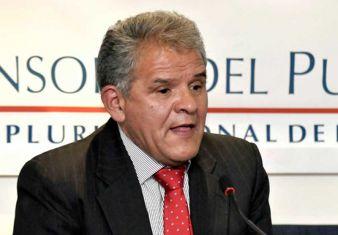This week, Bolivian government officials and lowland indigenous leaders agreed on a new regulation to define the “untouchable” character of the TIPNIS national park and indigenous territory. Still, the controversy over the proposed TIPNIS highway continues, six weeks after pressure from indigenous protesters forced President Evo Morales to sign a law officially cancelling the road.
The regulation addresses a highly contested provision of the law that declares the TIPNIS to be an “untouchable” ecological zone. Citing this provision, Morales promptly banned all commercial enterprises operating within the park under the auspices of the autonomous TIPNIS government, including an ecotourist lodge, several timber companies, and caiman and crocodile harvesting operations.
TIPNIS indigenous groups say these activities, which generate significant revenues for their communities, are protected under the territorial rights granted to them by the Bolivian Constitution. The government’s precipitous action in advance of the regulation, they argue, was as an act of political vengeance against opponents of the road.
The new regulation prohibits illegal settlements, land occupations, and megaprojects within the TIPNIS reserve, including highways, railroads, dams, and hydrocarbons exploration and exploitation. It also recognizes native TIPNIS groups’ exclusive rights to utilize and sustainably manage the natural resources within their territory, according to their own concepts of development and the principle of “vivir bien” (living well, in harmony with nature). Commercial activities sponsored by these groups are not prohibited, but must be evaluated based on technical standards to be agreed upon within 60 days.
Both sides have professed satisfaction with the compromise, which still requires Cabinet approval. But many questions remain unanswered. What will define an acceptable commercial activity? Will the revoked environmental licenses of existing enterprises be reinstated? Will TIPNIS indigenous groups be required to have exclusive, or majority, ownership and control of permitted operations?
Existing business relationships between native communities and private companies operating in the park appear to be less than optimal in some cases—for example, the ecotourist lodge charges $7,500 per customer but pays only $460 to the sponsoring communities, indigenous governments, and park service combined. Some TIPNIS groups are now seeking to set up mixed enterprises with more community control—a potential outcome of the current controversy that could be highly beneficial.
Despite this conciliatory effort, tensions continue to mount as pro-road sectors in the Cochabamba and Beni  departments (which the cancelled road would connect) intensify their campaign to revive the TIPNIS highway. Some 45 cocalero, campesino, civic, and municipal organizations have announced plans to participate in a December 9 mobilization spearheaded by the Cochabamba governor, who is also promoting legislation in favor of the road in the departmental assembly. Meanwhile, a commission sponsored by the Beni governor has proposed an alternative route bordering the park which it claims can be built at no additional cost.
departments (which the cancelled road would connect) intensify their campaign to revive the TIPNIS highway. Some 45 cocalero, campesino, civic, and municipal organizations have announced plans to participate in a December 9 mobilization spearheaded by the Cochabamba governor, who is also promoting legislation in favor of the road in the departmental assembly. Meanwhile, a commission sponsored by the Beni governor has proposed an alternative route bordering the park which it claims can be built at no additional cost.
Indigenous groups allied with coca farmers in the park’s southern zone say they will march to La Paz later this month to demand construction of the road. Some legislators affiliated with the MAS (Movement towards Socialism) government are seeking to revive the concept of a consulta or referendum, while others are promoting a legal challenge to the law cancelling the highway, on the novel theory that the government’s failure to implement a consulta violates the rights of indigenous groups who favor the road. TIPNIS leaders allege that a group of cocaleros and colonists recently used chainsaws and machetes to open a path in the park’s nucleus, to symbolically jump-start the TIPNIS road.
While the government says it will respect the law, TIPNIS leaders accuse Morales and other officials of inciting pro-road sectors in an effort to undermine the highway ban. Morales has been actively meeting with groups that favor the road, reportedly footing the bill to fly a delegation of indigenous road supporters into La Paz. He continues to state publicly that there are no feasible alternative routes outside the TIPNIS to connect the road segments leading to and from the park that are already under construction.
Still, Morales denies responsibility for rekindling the conflict, and says it’s not the government’s responsibility to resolve the continuing dispute between social sectors. “The highway, for me, has passed into history,” he stated recently. “We have guaranteed the financing [to build it]. If some [TIPNIS] leaders don’t want the road, those who do want it should make demands on their leaders, not the President.”
This stance, and the perceived contradiction between the government’s words and deeds, does not sit well with many Bolivians. In a recent survey, more than two-thirds of those polled (in the nine departmental capitals plus El Alto) said they want their president to be a conciliator, encouraging dialogue and reconciliation among opposing sectors. Only 33% voiced their support for the Morales government, and 55% disapproved. (However, these polls do not include the countryside, where Morales retains strong support from peasant organizations.)
Another factor adding to the government’s credibility gap is the lack of accountability for the brutal police repression of the TIPNIS marchers on September 25. A recent report by Bolivia’s human rights ombudsman calls the intervention an illegal action, documents numerous violations of the protestors’ human rights, and names ex-interior minister Sacha Llorenti as the “intellectual author.” The Ombudsman recommends criminal action against 16 current and former government and police officials, including Llorenti. The government rejects the report as biased and lacking in context, but has yet to initiate an internal investigation or provide an official alternative explanation.
In short, while the new regulation defining “untouchability” may represent a hopeful step forward, the TIPNIS conflict shows no sign of abating any time soon.
Read more on the TIPNIS conflict on Emily Achtenberg's blog, Rebel Currents, or check out our November TIPNIS photo essay. See also, the January/February 2011 NACLA Report, "Golpistas! Coups and Democracy in the 21st Century;" the September/October 2010 NACLA Report, "After Recognition: Indigenous Peoples Confront Capitalism;" and the September/October 2009 NACLA Report, "Political Environments: Development, Dissent, and the New Extraction." Or subscribe to NACLA.

